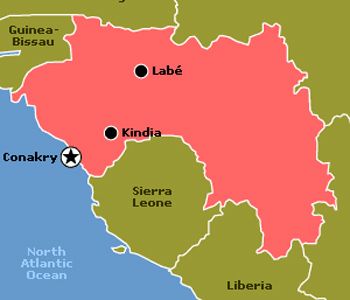Tense moment in Guinea…What is at stake for Sierra Leone?
Legislative Elections in Guinea were due six months after the first “democratically” elected President, Alpha Conde, took the oath of office. Mistrust among opposing factions dragged the process to almost three years. The opposition claimed that the government was bent on doing whatever it can to rig the elections and control parliament, whilst the government maintains that the opposition is hesitant to go to the polls for fear of losing. Negotiations spear-headed by the UN envoy Said Djinnit finally led to the elections of September 28, 2013. This is a significant date in Guinea, as it represents the infamous “No” vote for independence from France, and also the date in which hundreds of civilians protesting an end to the military leadership of Captain Moussa Dadis Camara were massacred, raped and tortured at the stadium also named September 28 Stadium. Voting went on peacefully, with a participation rate of about 70 to 80%,a record in Guinea, and a clear indication of how delicate these elections were to the people of this country.
However, accusations and counter-accusations of fraud, ballot stuffing and intimidation from both sides has pushed the “Republican Opposition” led by Cellou Dalein Diallo and Sidya Toure to request the annullment of the elections. A government spokesman has called this move irresponsible, and claimed that his party will be the majority in parliament after the final tally. On the other hand, many observers have cited irregularities during the voting and tallying .The United Democratic Front of Guinea(UFDG) has just released a statement requesting the release of its Secretary in one of the main communes of Conakry (Matam), who was arrested on election day after interrogating a local official supposedly distributing voter cards and envelopes to supporters of the ruling party outside a polling booth. He is still in custody. Others like the former Prime Minister Lansana Kouyate, claimed that his party officials were literally kicked out of voting booths in some areas. The ruling party has also claimed that it will request the annullment of elections in the areas of Boffa and the main seat of power, Kaloum, for alleged irregularities. The people of Guinea are nervously waiting for a final resolution to the process that is supposed to end the transition started after the death of Lansana Conte, the former President.
Reports from Guinea state that the main International Market, Madina Marche, has been shut down for the past two weeks. Traders are worried that security might break down, and the opposition has promised to call on its supporters to take to the streets if the elections are not nullified. This is troubling, since every time there have been demonstrations, many people have lost their lives and properties, and most of these demonstrations have also been marred by tribal sentiments. Many independent observers have warned that instability in Guinea can have a negative effect on the entire sub-region, especially its immediate neighbors in the Mano River triangle, Liberia and Sierra Leone, two countries that are still healing the wounds left by years of brutal civil wars. Since President Conde came to power, about 50 people have been killed by security forces in demonstrations called by the opposition, protesting the head of the electoral commission, who was later removed, and some during rallies welcoming one of the opposition leaders, Cellou Dalein Diallo.
Guinea is the largest producer of bauxite in the world, and also boasts a significant amount of untapped iron ore deposits, in addition to diamonds, gold and other minerals. It is also believed to have a considerable amount of offshore oil and strategically placed to be a hub for business, bordering six countries. Whilst very rich in natural resources, it is also believed to be one of the poorest countries in the world, and most of its population live with under a dollar per day. Basic infrastructure like water, electricity and roads are poor, if not non-existent. Guinea is also the source of many rivers in the West African sub-region (the Gambia, Niger, etc).This is why expectations were high for investors after the presidential elections, but the continued delay of the parliamentary elections and political instability that has led to many demonstrations and deaths of innocent civilians has kept investors at bay. The European Union alone is holding back about 200 million dollars worth of development aid until the successful conclusion of these elections. Any breakdown in security will mean another delay for long awaited investment dollars.
Whilst no one wishes instability for Guinea, Sierra Leone in particular, has a great interest in stability for its neighbour. The two countries not only share boundaries, but also human and economic resources. President Earnest Bai Koroma just concluded a peace deal with President Conde, securing Yenga, a small town in Eastern Sierra Leone near Koindu, that was confiscated by the government of Lansana Conte during Sierra Leone’s civil war. Many Sierra Leonean traders travel to and from Guinea to purchase goods for resale in Sierra Leone, thereby bringing in monetary resources in terms of custom duties and taxes to the Sierra Leone government. Guinean businessmen use the Sierra Leone Ports to import goods in transit to Guinea. Of course the bi-lateral relationship between the two sister countries is in every need of a peaceful and quiet neighbourhood in order to be sustainable. Whilst the world awaits the final results of the elections, we hope and pray that reasons will prevail over emotions in Guinea.
By :Algassimu Monoma Bah, Philadelphia,PA.
Stay with Sierra Express Media, for your trusted place in news!
© 2013, https:. All rights reserved.




